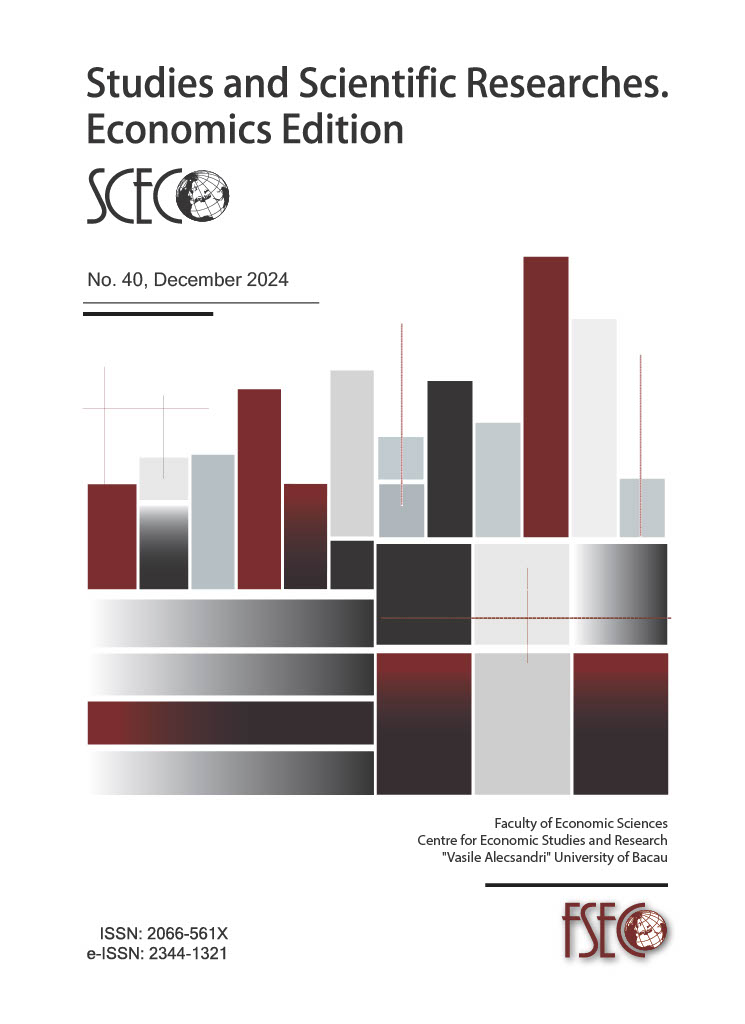Effect of firm size and firm profitability on earning management among listed firms on Nigeria Exchange Group
DOI:
https://doi.org/10.29358/sceco.v0i40.581Keywords:
earning management; accrual-based earnings management; real earnings management; firm size; firm profitabilityAbstract
The main objective of the study is to evaluate the effect of firm size and firm profitability on earning management among listed firms on Nigeria Exchange Group. This study specifically seeks to ascertain the effect of firm size and firm profitability on both accrual-based earnings management and real earnings management activities. The study focused on non-financial listed firms on Nigeria Exchange Group for the period of 2013 to 2023. The study adopted ex post facto research design and purposive sampling was used to select sample population. Secondary source of data was extracted from financial reports and accounts of sample firms from either companies’ corporate web site or Nigeria Exchange Group Factbooks. This study found that firm size and firm profitability affects both discretionary accruals management and real earnings management. the study recommends among others that since profitable firms tend to engage in both discretionary accruals management and real earnings management. Though profitability showed management’s ability to generate profit, financial regulators should encourage them to improve their financial reporting quality and reduce earning management practice.
Downloads
References
Abbadi, S. S. (2021). Impact of firm size, firm age, and family control on accrual earnings management: Evidence from Jordan. Journal of Management Information and Decision Sciences, 24(S1), 1–14.
Altarawneh, M., Shafie, R., & Ishak, R. (2020). Chief executive officer characteristics and financial restatements in Malaysia. International Journal of Financial Research, 11(2), 173–186.
Alzoubi, E. S. (2017). Audit quality and earnings management: Evidence from Jordan. Journal of Applied Accounting Research, 17(2), 170–189.
Bahaaeddin, A. (2020). The impact of firm-specific characteristics on earnings management: Evidence from GCC countries. International Journal of Managerial and Financial Accounting, 10(3), 1–20.
Bassiouny, S. W., Soliman, M. M., & Ragab, A. (2016). The impact of firm characteristics on earnings management: An empirical study on the listed firms in Egypt. The Business and Management Review, 7(2).
Cohen, D., & Zarowin, P. (2010). Accrual-based and real earnings management activities around seasoned equity offerings. Journal of Accounting and Economics, 50(1), 2–19.
Erna, W., & Olivia, R. T. G. (2022). The impact of ownership structure on earnings management: Evidence from the Indonesian stock exchange. Journal of Accounting, Finance and Auditing Studies, 8(1), 152–175.
Fialova, V., & Folvarcna, A. (2020). Default prediction using neural networks for enterprises from the post-Soviet country. Ekonomicko-manažerské spektrum, 14(1), 43–51.
Jelinek, K. (2007). The effect of leverage increases on earnings management. Journal of Business & Studies, 13(2), 24–46.
Lazzem, S., & Jilani, F. (2018). The impact of leverage on accrual-based earnings management: The case of listed French firms. Research in International Business and Finance, 2(3).
Mellado-Cid, C., Jory, S. R., & Ngo, T. N. (2018). Real activities manipulation and firm valuation. Review of Quantitative Finance and Accounting, 50(4), 1201–1226.
Pranesh, D., & Chinmoy, R. (2017). Do firm-specific characteristics influence earnings management? Contemporary evidence from the Indian economy. Asian Journal of Research in Business Economics and Management, 7(6), 318–336.
Roychowdhury, S. (2006). Earnings management through real activities manipulation. Journal of Accounting and Economics, 42(3), 335–370.
Salleh, N. M., & Haat, M. H. (2014). Audit committee and earnings management: Pre and post MCCG. International Review of Management and Business Research, 3(1), 307–318.
Sara, W. B. (2016). The impact of firm characteristics on earnings management: An empirical study on the listed firms in Egypt. Journal of Business and Retail Management Research, 10(3), 34–45.
Shah, C., & Khan, N. (2007). Liquidity management and profitability: A case study of listed manufacturing companies in Sri Lanka. International Journal of Technological Exploration and Learning, 2(4), 2319–2135.
Uwuigbe, O. R., & Okorie, B. (2015). Assessment of the effects of firms’ characteristics on earnings management of listed firms in Nigeria. Asian Economic and Financial Review, 5(2), 218–228.
Zang, A. (2012). Evidence on the trade-off between real activities manipulation and accrual-based earnings management. Accounting Review, 87(2), 675–803.
Downloads
Published
Issue
Section
License
Copyright (c) 2024 Segun Idowu Adeniyi

This work is licensed under a Creative Commons Attribution 4.0 International License.
Authors who publish with Studies and Scientific Researches. Economics Edition (SCECO) agree to the following terms:
-
Copyright Retention
Authors retain full copyright over their work and grant the journal the right of first publication. The published article is simultaneously licensed under the Creative Commons Attribution 4.0 International License (CC BY 4.0). This license permits others to:-
Share — copy and redistribute the material in any medium or format
-
Adapt — remix, transform, and build upon the material
for any purpose, even commercially, as long as proper attribution is given to the original author(s) and source.
-
-
Additional Distribution
Authors may enter into separate, non-exclusive contractual arrangements for the distribution of the journal’s published version of the work (e.g., post it to an institutional repository, include it in a book), with clear credit to the initial publication in SCECO. -
Preprint and Open Posting Policy
Authors are encouraged to post their work online (e.g., in preprint archives, institutional repositories, or personal websites) before submission, during review, and after publication.
This practice supports academic exchange and can lead to earlier and broader dissemination and citation of published work.
(See: “The Effect of Open Access” – PLOS)
For further inquiries regarding copyright, licensing, or archiving, please contact the editorial office at Editorial Board








